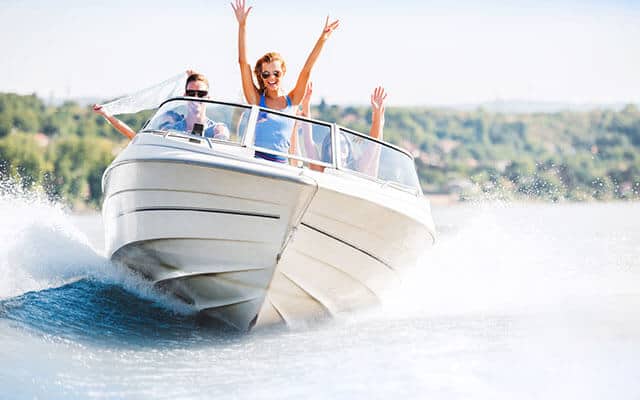Top 10 Safety Boating Guidelines
The water is a beautiful place to be, but it can also be a dangerous place to be. If you don’t take the proper precautions when out on your boat, you could be putting yourself and your passengers in extreme danger. Here are the Top 10 safety boating guidelines that every boater and fisherman should follow when heading out for the day:
10) Be wise about the weather
This one should be obvious, but there are many who choose to ignore it and end up regretting it later. When heading out on the boat it’s not only important that you check the current weather and water conditions, but is also important that you check the weather forecast for the rest of the day. Water conditions can change drastically very quickly, so it’s always a good idea to know what to expect in the hours to come. While out on the water, pay close attention to weather signs. If you see the clouds beginning to darken, the water beginning to roughen, the winds beginning to pick up, or the temperature suddenly dropping, take your boat in immediately.
9) Wear a lifejacket – Safety Boating Guidelines
According to statistics, over 76% of people in fatal boating accidents drowned. Eighty-five percent of those who drowned were not wearing a life jacket. None of us can predict emergencies or accidents, but in the case that we ever experience one it is important that we have life jackets on hand. The best advice is to wear a life jacket at all times. But if you are not willing to do so, at least have life jackets on hand. You should have enough life jackets on board for each passenger in the boat, and they should always be easily accessible in case of emergency.
8) Stay away from alcohol
If you are captain of the boat, stay away from alcohol. Just like drinking and driving, drinking and boating can be extremely dangerous. Drinking can drastically impair your judgement and puts you and all of your passengers at risk. In addition, if you get caught drinking while boating you could (and almost certainly will) lose your boating license.
7) Bring along a co-captain – Safety Boating Guidelines
Never go boating alone. You should always have someone else with you who has their boating license and is familiar with your boat. Just as you cannot predict emergencies with the water, you also cannot predict emergencies with yourself. It is always important to bring someone along in case you become unable to operate the boat. Having a set of extra eyes and ears is never a bad idea when boating either.
6) Create a checklist – and check it twice
Creating a checklist is a good way to make sure you have all of your safety necessities on board before heading out on the water. Your list should include things like personal floatation devices, sound signalling devices, lights, distress signals, tools and spares, fire extinguishers, and extra fuel and oil. You may also want to add things that you should check before leaving such as your fuel level, the ventilation within the boat, the weather forecast, your bilges, and your battery.
5) Learn to swim – Safety Boating Guidelines
Did you know that most drownings occur within 15 meters of shore? This is another case where wearing a lifejacket can save your life, but so can learning to swim. A lifejacket will help you to stay afloat, but it won’t help you get to shore. Your ability to swim to shore could save your life, as well as the life of other passengers who may not be as good of swimmers.
4) Let someone know your plan
Whenever you are travelling somewhere, you should always let someone know your plan. Let a responsible person know where you are going, who else is on board, and when you are expected to return. This way if you have an emergency and are stuck on the water, they will be able to contact someone to send help. It is also a good idea to have a marine radio aboard so that you can contact other nearby boaters if necessary.
3) Use Common Sense – Safety Boating Guidelines
Be alert. Don’t speed. Steer clear of large vessels. Respect buoys and navigational aides. Slow down when reaching shore. These are all things that our common sense would tell us and that will help to keep us safe when on the water.
2) Know your local waterways
The more you know about the waterways you are boating on the safer you will be. Knowing the hazards that surround you could prevent an accident and even save your life. If you aren’t already familiar with the area in which you are boating, refer to local marine charts and locate preferred navigation channels before leaving. Also, pay close attention to the signs and signals of local hazards as you are operating.
1) Take a safety course
Beginners always need to know safety boating guidelines and take boating course before they can get their operators license. If this is your situation, pay close attention to safety instructions. These courses are not just here to take your money, they are here to promote your safety – pay attention to them and understand them before ever stepping into the drivers seat of a boat. If you are a more advanced boater, it never hurts to update your memory. Additional courses are always available for boat safety and it’s always important to remain knowledgeable and educated so that you can be prepared for any circumstance that may arise.

